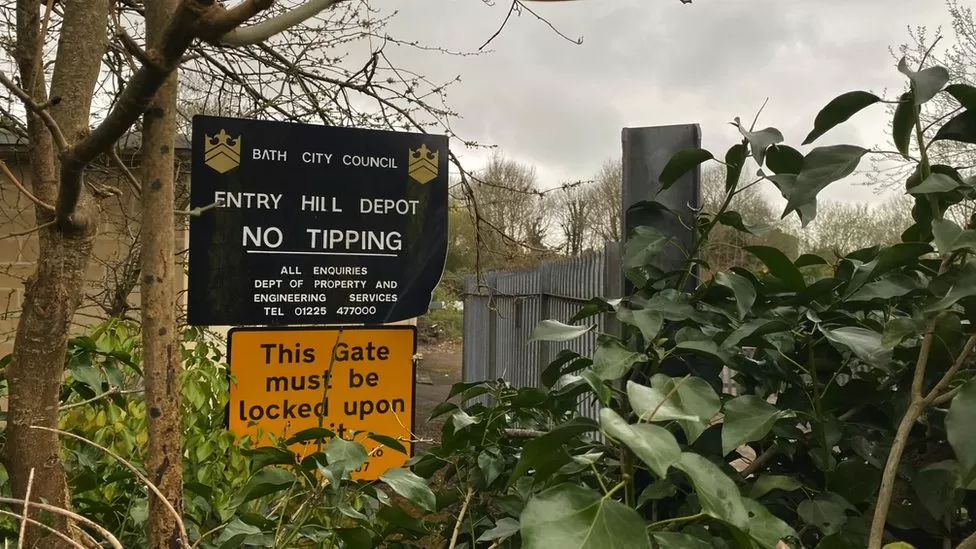By John Wimperis, Local Democracy Reporter: Land next to a Bath golf course which the council made a controversial agreement to sell to a local manufacturing company had already been “rejected” as a site for housing, a top councillor has said – reports Local Democarcy Reporter John Wimperis.
16 councillors on Bath and North East Somerset Council signed a “call-in” of the single-member decision by former councillor Richard Samuel to sell the Entry Hill Depot site, bringing it before the council’s corporate policy development and scrutiny panel last month.
Councillors criticised the decision to sell the site to local engineering firm Cross Engineering after an independent “Red Book” valuation rather than putting it up for sale on the open market, and questioned whether it could have been used for housing.

But the committee voted to dismiss the call-in after council cabinet member economic and cultural sustainable development Paul Webber said the site had been “rejected” for housing six years ago, and the sale to Cross Engineering would create 15 jobs.
The site is next to, but not a part of, the Entry Hill Golf Course — which has faced its own controversy around its future use.
Councillor Saskie Heijtjes said councillors believed the decision on April 13 to agree to the sale was “rushed and unfair due to the local elections.”
She proposed that the sale be halted for the council to look at the environmental impact and to explore the option of using the site for council housing.
She said: “There was insufficient consultation with only five days allowed for responses. Councillors have also expressed deep concerns about transparency as the site was not listed on the market but sold by the Red Book valuation approach.
“My main concern is that the council seems to be keen to welcome a factory into a densely populated residential area of the city within a world heritage site without any regard for the ecological environment or the community.”
Also supporting the call-in, Councillor Shaun Hedges said: “The site is rare, desirable, and unique so how can we have confidence in a Red Book valuation without testing the market and understand all the interested parties and development options.
“The report seems to place weight in a capital receipt in this financial year, but surely its more important to find the best outcome, however long it takes. After all, we will have to live with the result of this for decades to come.”
Councillor Eleanor Jackson added: “I think we are back again with the saga of the family silver being sold off.”
She said: “It reminds me too much of privatisation in the Thatcher–Major era when national assets were sold undervalued and we are now paying the price with privatised water supplies and private public transport. Our residents expect you to look after our heritage, not flog it for a quick gain.”
She said that the site could be reallocated for housing in a future local plan.
But Mr Webber, representing the position of Mr Samuel who has now retired from the council, said that the site had been considered for housing six years ago and found to not be suitable.
He told the committee: “The subject site has been redundant for several years and is surplus to operational requirements. Its historic use has always been industrial in nature, from the initial quarry workings to its use as a corporate depot used by highways.
“Once it became apparent that this site was surplus to operational requirements, it seemed obvious that the council should look for alternative uses that could fulfil the council’s objectives and therefore the council’s associated housing company ADL undertook due diligence, an investigation to potentially develop the site for residential accommodation. A HABR architect feasibility report together with an ecological survey were produced in June to October 2017.
“For many reasons including ground conditions, ecology, highways issues, and contamination, ADL rejected the opportunity to bring the site forwards for residential development.”
In August 2020, he said the council had received an unsolicited request from Cross Engineering to buy the site as “a satellite manufacturing facility to their existing prememis nearby.”
He added: “The new facility at Entry Hill could add a minimum of 15 members of staff in the short term and therefore an additional [gross value added] of £1.4m a year, with potential for additional growth and well as securing the future for this valuable company in Bath.”
Councillors Tom Davis, Winston Duguid, and Alison Born had attended a site meeting to discuss having housing on part of the site but it was judged to not be feeble, he added.
Mr Webber said: “The fact that this matter has been considered informally by a number of councillors and at length by the former councillor and cabinet member for resources leading to a formal member officer board providing their steer towards a formal member decision, to my mind provides adequate transparency and governance. This is safeguarded further by seeking the endorsement by the head of corporate estate and a section 151 officer.
“Albeit, I do take the point that this is a high profile decision and it is unfortunate that its timing was so close to the local election and purdah period. I can only advise that the timing was not deliberate but a direct result of officer capacity.”
He added that any environmental issues would be dealt with at the planning permission stage of any building on the site, and that the felling of mature trees on the site had not been connected to the sale but due to ash dieback.
Councillors voted to dismiss the call-in and allow the decision to take immediate effect.
The ongoing saga of Entry Hill
Also on Entry Hill is the former golf course that has been the subject of much debate over its future.
A plan had been hatched to replace the golf links with a cycle park after the course was closed during the Covid Crisis.
The reason behind the plan was that the golf course required a large subsidy to keep it going as there were not enough golfers or patrons of the cafe to make it viable.
The plan to create a bike park fell through after the Bristol firm that already run a similar park in that city decided it could no longer proceed with the project.
Since then the golf course (and previously a land fill site) has reverted to being a park.

Bath Voice and Local Democracy Reporters
The journalists are funded by the BBC as part of its latest Charter commitment, but are employed by regional news organisations. A total of 165 reporters are allocated to news organisations in England, Scotland, Wales and Northern Ireland including Bath Voice. These organisations range from television and radio stations to online media companies and established regional newspaper groups. Local Democracy Reporters cover top-tier local authorities, second-tier local authorities and other public service organisations.
Bath Voice Monthly Newspaper is distributed free to thousands of homes and some supermarkets – distributed from the first of the month. Harry Mottram is the News Editor
Email him at news@bathvoice.co.uk Bath website: https://bathvoice.co.uk/news/
Bath Facebook: https://tinyurl.com/bdtf2kep Also on Twitter: https://twitter.com/bath_voice Read the newspaper online at :https://issuu.com/bathvoice To advertise to thousands of Bathonians call Erica on 07402 441485 or email her on erica@bathvoice.co.uk
Harry Mottram is a freelance journalist. Follow him on Facebook, LinkedIn, Twitter, Instagram, YouTube, Pinterest, Telegram, TikTok and Email:harryfmottram@gmail.com
Website:www.harrymottram.co.uk Mobile: 07789 864769

